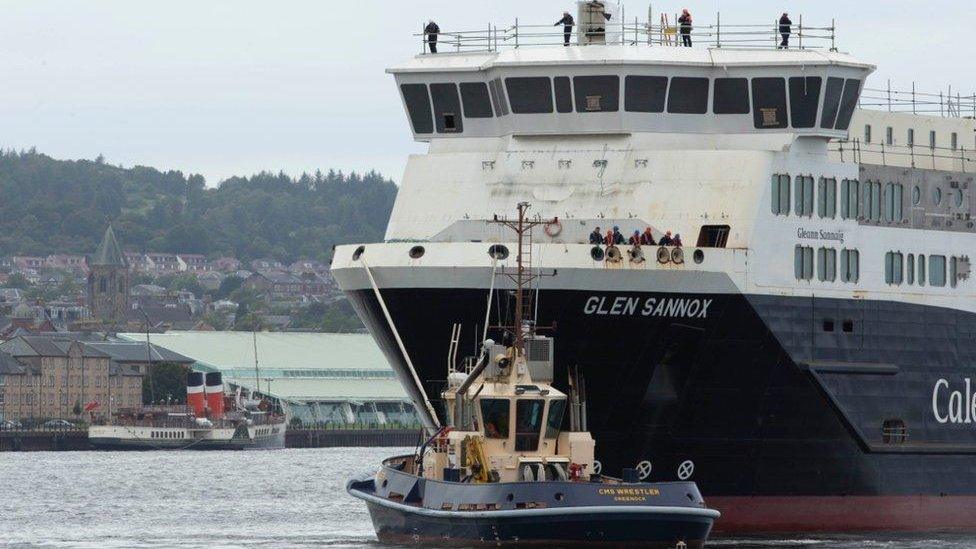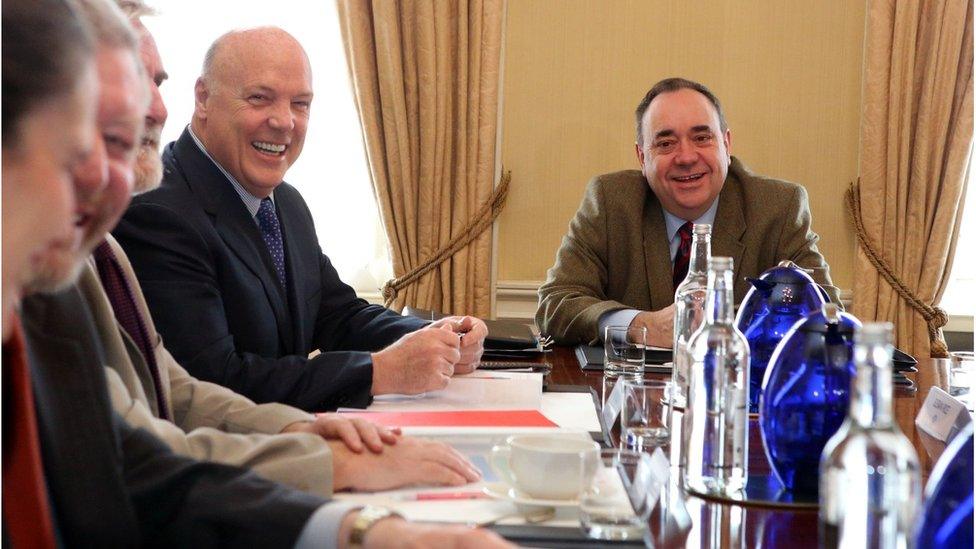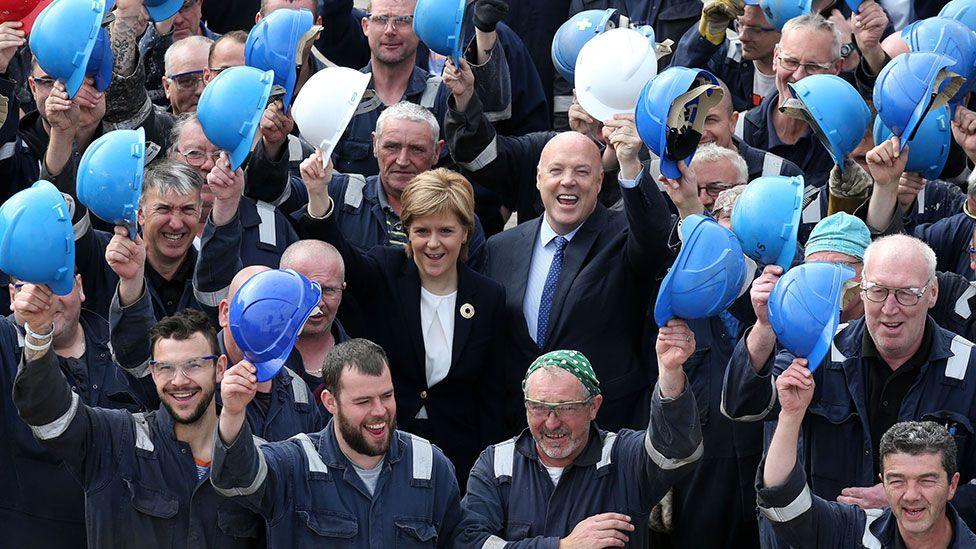Tycoon wishes he had walked away from ferry deal
- Published

Glen Sannox is one of two ferries yet to be fully completed
Businessman Jim McColl has said he would not have agreed a £97m contract to build two CalMac ferries if he had known the extent of opposition to it.
The 2015 contract was approved by ministers despite concerns from their own ferries agency CMAL about the lack of the normal financial safeguards.
Mr McColl claims the deal with Ferguson shipyard was rushed through "for political capital".
The Scottish government insists the deal was done to save hundreds of jobs.
After a series of problems, the ferries will now be five years late and could cost the taxpayer more than £250m.
Last week a damning report, external by Audit Scotland said it was unable to establish why the order was given to Ferguson without a normal builders refund guarantee because the decision had not been fully documented.
The Scottish government has now confirmed that it was the former transport minister, Derek Mackay who "agreed the award" of the CalMac ferry order.
Previously published documents suggested he had been the decision-making minister but noted that other more senior members of government were consulted. The first minister has said she bears "ultimate responsibility" for all decisions.
'Could have been avoided'

Jim McColl was a member of the Scottish government's council of economic advisers under both Alex Salmond and Nicola Sturgeon
Mr McColl, who rescued the shipyard from administration in 2014, told the BBC's Good Morning Scotland programme he had approved signing the original contract but that it "constantly changed".
And he maintained that had he known of the objections from CMAL- the government agency which owns and procures ships for CalMac - he would have pulled out.
He said: "How can you work with a buyer who doesn't want you to be there?
"CMAL were strongly opposed to this. They are the gatekeepers here and they should have been respected.
"What happened subsequently is costing the taxpayer a huge amount of money that could have been avoided."
First Minister Nicola Sturgeon has insisted the procurement process for the ferries was all in order and the deal had nothing to do with political gain.
"Jim McColl is flatly wrong to say that," she said in an interview on Monday.
"This was a contract that was awarded in line with all of the normal procurement rules and practices. It's also a contract that Jim McColl signed on behalf of his company.
"There have been real problems with the construction of these vessels. The delays to the completion of the vessels, the cost over-runs. All deeply unsatisfactory and lots of lessons to be learned there.
"But as I think the Audit Scotland report said, there was nothing untoward in the procurement of the contract at the time."

Nicola Sturgeon was photographed with Jim McColl when she announced Fergusons as the preferred bidder in August 2015
Shortly after being named as the government's preferred bidder, the Ferguson management notified CMAL that they could not provide the full Builder's Refund Guarantee (BRG), which was stipulated in the contract.
This would have provided full repayment guarantees if the ships were late, failed to meet specification or if the shipbuilder went bust.
The CMAL chairman, Erik Ostergaard, was so concerned he emailed Transport Scotland suggesting that without a much improved offer, the procurement process should be restarted.
While some changes were negotiated, the deal was signed off without a full refund guarantee by ministers in October 2015.
Jim McColl has claimed the SNP rushed through the deal because it wanted good publicity at its party conference in 2015 where the deal was announced by then transport minister Derek Mackay.
'Propaganda exercise'
Following a series of construction issues, the tycoon says he called for an independent review to try to resolve the situation.
He said: "Early on in the contract, after seeing there were additional costs, we wanted to have some sort of mediation, arbitration or expert determination on this.
"Every time this was raised, the government would not confront CMAL to insist we do this.
"I raised this directly with the first minister on 31 May 2017. So they were aware of the challenges then.
"I couldn't understand why they resisted any sort of dispute resolution and I kept asking the question - what is it they are afraid of with CMAL?
"The point that CMAL objected to, we weren't aware of at the time. This has been uncovered by Audit Scotland but was buried by the government."
Mr McColl added: "I'm sure there is a small amount of responsibility that was with Fergusons.
"But I had an independent review carried out by experts in 2017/2018 and they were highly critical of the way the specification was put together.
"There has been a fabulous propaganda exercise carried out by the government to try and put the blame onto the previous management at Fergusons."


Jim McColl was once an economic adviser to the Scottish government and backed the 'yes' campaign in 2014.
He has since changed his mind on independence and has now spectacularly fallen out with SNP ministers over the CalMac ferry order placed with his shipyard.
He accuses them of rushing the contract for political purposes and conducting a "fabulous propaganda exercise" to blame his team at the Ferguson yard for huge delays and cost overruns.
The economy secretary Kate Forbes has hit back, denying political motivation and accusing Mr McColl of "shifting the blame"to deflect from construction problems on his watch, before nationalisation.
So far, so messy. But there's more. Mr McColl denied signing the original contract. However, the BBC has seen an unredacted copy of this document and it seems that he did. His signature appears alongside that of the then chief executive of ferry company CMAL, Tom Docherty.
The Scottish government probably hopes this contradiction casts doubt on the credibility of some of Mr McColl's other claims.
It also draws attention away from another key question: why did the Scottish government decide to allow the contract to be signed, when CMAL had advised that is was too risky?

Questioned about the comments at Holyrood, Finance Secretary Kate Forbes said Mr McColl had signed the contract himself - and that his firm were "crystal clear" about CMAL's concerns about the deal.
She said: "This is a man with a clear interest in shifting the blame on to others when the root cause ultimately of the delays to these ferries was the construction under FMEL."
CMAL has repeatedly disputed Mr McColl's version of events during the ferry saga, pointing out that it was a "design and build contract", meaning the detailed design was the responsibility of the shipyard.
It has accused the shipyard of rushing ahead with fabrication before these designs were approved by both itself and regulators.
The shipyard went back into administration in August 2019 and was later taken into public ownership by the Scottish government.
A report by a "turnaround director" appointed by the government later listed major failings in the running of the yard and construction of the two ferries, with remedial work estimated to cost between £110m and £114m.
That has since risen by a further £8.7m because cables installed prior to nationalisation have been found to be too short.
Delays have also meant equipment warranties have expired, and £3.5m will have to be spent renewing them.
The final bill, including two Scottish government loans totalling £45m that have largely been written off, is likely to be in excess of £250m.